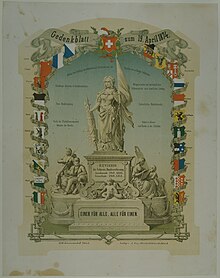Unus pro omnibus, omnes pro uno

Unus pro omnibus, omnes pro uno ( French Un pour tous, tous pour un , Italian Uno per tutti, tutti per uno , Romansh In per tuts, tuts per in ) is a Latin phrase that ends in German with one for all, all for one is translated. It comes from the novel The Three Musketeers by the French writer Alexandre Dumas the Elder , who published chapter by chapter in the newspaper Le Siècle in 1844 and became the (unofficial) motto of the Swiss Confederation in the 19th century .
Traditional Swiss motto
Although Switzerland does not have an official motto or a national motto in its constitution or laws, the traditional motto One for All, All for One is a historical short formula for the purpose of the federal alliance policy, as it was recorded in numerous federal letters and those in the founding of the state culminated.
The motto became popular in the 19th century after autumn storms in 1868 led to major floods in the central Swiss Alps , particularly in the canton of Ticino . The Federal Council then issued an appeal for donations to the Swiss people. The press took part in the appeal for donations and used this motto, which also appeared on an appeal from western Switzerland . In the 19th century, the collections of money for natural disasters became identity-creating events for Switzerland as a will- to-be nation and encouraged Swiss solidarity.
Fundamental rights principle in North Korea
According to Article 63 of the Constitution of the Democratic People's Republic of Korea , the fundamental rights and duties of the citizens of North Korea are based “on the collectivist principle of one for all, all for one! ".
literature
- Christian Pfister , Stephanie Summermatter (ed.): Disasters and their coping. Perspectives and Positions (= Bern University Writings. Vol. 49). Haupt, Bern 2004, ISBN 3-258-06758-9 .
Web links
Individual evidence
- ^ Federal Supreme Court: Le principe de fraternité dans la devise de la Suisse ( Memento of March 27, 2006 in the Internet Archive ).
- ^ Christian Pfister: From Goldau to Gondo. Natural disasters as identity-creating events in 19th century Switzerland. ( Memento from September 24, 2015 in the Internet Archive ) (PDF; 1.6 MB) In: Christian Pfister, Stephanie Summermatter (Ed.): Disasters and their coping. Perspectives and Positions (= Bern University Writings. Vol. 49). Haupt, Bern 2004, ISBN 3-258-06758-9 , pp. 53-78.
- ^ Constitution of North Korea from 1992.

